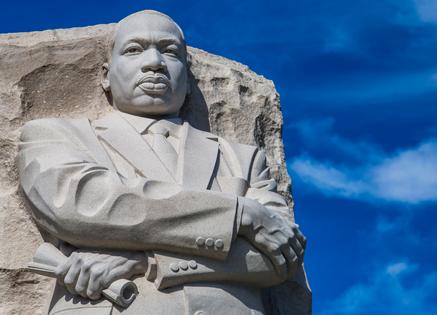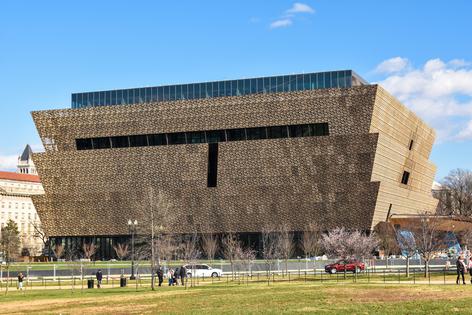Taking the Kids: Celebrating Black History Month - from home
Music, good eats, and plenty of positive vibes… If you are thinking this sounds like a fun festival, you’re right — with one big difference. This pandemic winter, the Association for the Study of African American Life and History kicks off Black History Month 2021 with its first virtual festival, dedicated this year to “The Black Family: Representation, Identity and Diversity.”
There will be sessions throughout the month on everything from “Finding Our Roots in African American History,” during which Harvard professor Henry Louis Gates Jr. will share insights from his work on the PBS show “Finding Your Roots,” to how food influences African American traditions (Feb. 6) and (on Feb. 28) growing up in a single-family home, featuring Rev. Bernice King, daughter of the Rev. Martin Luther King Jr. and Coretta Scott King. “Diving with a Purpose” (Feb. 24) focuses on the efforts to preserve the heritage of Black people through discovering wreckages of slave ships.
Typically, this would be a month to visit Washington, D.C., and the National Museum of African American History and Culture, the Martin Luther King, Jr. Memorial, and other historic sites and museums devoted to Black history. But this isn’t a typical year. At the same time, there’s never been a more important time to focus on Black history and the contributions African Americans have made and continue to make to our culture and our country, as well as the continuing struggle against racism, demonstrated yet again during the mob takeover of the U.S. Capitol on Jan. 6, 2021, complete with domestic terrorists marauding through the Capitol Rotunda with Confederate flags.
Unfortunately, many historic sites and museums, like the National Museum of American History and the Museum of the African Diaspora in San Francisco and the National Civil Rights Museum in Memphis, remain closed, though they and others continue to offer virtual programming. Others like the African American Museum in Philadelphia, the first built by a major U.S. city to interpret the life and work of African Americans, the National Underground Railroad Freedom Center in Cincinnati and the Birmingham Civil Rights Institute are among the museums that have reopened with reduced hours and COVID-19 health protocols. The National Park Service Network to Freedom program includes more than 650 sites that have a connection to the Underground Railroad.
At Thomas Jefferson’s beautiful plantation home Monticello in Charlottesville, Virginia, visit the slave quarters and see if you can understand the contradictions in the life of the man who wrote the Declaration of Independence yet owned slaves and fathered children with one of them.
The Martin Luther King Jr. Memorial in Washington, D.C., is open; You can also take a virtual tour or zoom into a service at the historic Ebenezer Baptist Church in Atlanta, where Dr. King preached and where newly elected U.S. Senator Rev. Raphael Warnock has been the pastor. It is part of the National Martin Luther King Jr. National Historical Park, the city’s top tourist attraction with a new outdoor exhibit and Rev. King’s birth home, which is currently closed.
The National Historical Park is on the U.S. Civil Rights Trail, as are the APEX Museum of African and African-American Rights, the Center for Civil and Human Rights (both open with reduced hours ).
The trail includes 15 states and the District of Columbia, from Alabama (walk across the Edmund Pettus Bridge in Selma where the famous 1965 Selma-to-Montgomery march for voting rights — and the violence the marchers endured on “Bloody Sunday” — shocked the nation and led to the passage of the U.S. Voting Rights Act) to West Virginia, Missouri to Mississippi where you can visit the Mississippi Civil Rights Museum in Jackson. The museum gives special attention to the murder of Chicagoan Emmett Till, just 14 in 1955, who was visiting relatives in Mississippi when he was killed in a racist attack after being falsely accused of harassing a local white woman and that of Mississippi civil rights leader and WWII veteran Medgar Evers in 1963, who was assassinated by a white supremacist in his driveway. Both of their deaths sparked national outrage and galvanized the civil rights movement.
Backroads, the leader in active travel, in conjunction with Outdoor Afro, the nation’s foremost network for celebrating Black connections and leadership in nature, has announced a new Historic Underground Railroad Multi-Adventure Tour in Georgia and South Carolina in October, offering the chance to take a deep dive into the Black history of the Southeast while hiking, biking and kayaking
In Birmingham, Alabama, the 16th Street Baptist Church, the site of the 1963 bombing that killed four young black girls, is open for tours, among other sites.
...continued
(c) 2021 DISTRIBUTED BY TRIBUNE MEDIA SERVICES, INC.












